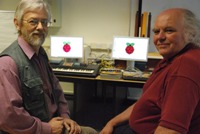Robotic orchestra

Dave Price (right) and Ian Izett creators of the Raspberry Pi Robotic Orchestra
20 June 2013
A robotic orchestra made of discarded instruments, a hoover and controlled by two tiny Raspberry Pi computers, will give its first public performance at the Bandstand at Aberystwyth on Saturday 22 June.
Designed and developed by Dave Price and Ian Izett from the Department of Computer Science at Aberystwyth University, the Raspberry Pi orchestra’s repertoire includes traditional Welsh folk tunes such as Ty Crwn (Roundhouse) and recent chart hits including the enigmatic Gangnam Style by South Korean musician Psy.
A lecturer of 30 years at Aberystwyth, Dave Price’s interest in computing started in March 1972 and over the decades he has seen computers the size of a bedroom shrink to the size of a credit card with even more power and speed.
Dave also loves instruments – his collection includes string, wind and percussion instruments, some of which he has built and none of which he can play!
Ian, the department's design engineer, joined the University over 20 years ago, having previously been a post office electronics engineer at the London Television Network switching centre.
Combining their interest in technology and music Dave and Ian's Robotic Orchestra includes two Raspberry Pis: one Pi is the 'musician', generating music from MIDI files; the other Pi is the 'conductor', directing the music played robotically by an electric keyboard, a glockenspiel and a pipe organ.
The orchestra is a real Heath Robinson type creation, part of which was Dave's GCE O Level school woodwork project in 1969.
Dave says, “There is a huge interest in the small Raspberry Pi, a credit card sized computer, now being manufactured in Sony’s UK factory in Pencoed, South Wales. The founders of the Pi want to ensure that computing is affordable and accessible so that young people can develop their skills in programming and electronics.”
Dave has been supporting the local hub of Technocamps based at Aberystwyth University, a European funded project aimed at inspiring young people to develop their skills in computing beyond the usual screen and keyboard.
The Aberystwyth Technocamps hub has met over 800 young people in the region, introducing 11 to 19 year olds to a range of topics in order to encourage them to become producers not just consumers of technology.
The Robotic Orchestra and other digital creations will be on show at Beach Lab, a free public event at Aberystwyth bandstand, promenade and beach from 11am to 3pm on Saturday 22nd June.
Beach Lab forms part of Aberystwyth University’s community open day, Access All Areas, which takes place between 10am and 3pm on Saturday 22 June and a full timetable of events is available at www.aber.ac.uk/access-all-areas.
The one-day event is open to all who are keen to experience technology in the open air with flying kites (with on-board cameras), land and sea robots, wearable technology, Raspberry Pis, Arduinos, 3D printing, mobile apps and much more.
For more details on the Technocamps Beach Lab go to http://www.technocamps.com/events/beachlab: Places are limited and available on a first come first served basis, and registration is a must. For more details and to book your place go to www.technocamps.com or contact Lisa Fisher on 01970 622454/ lisa.fisher@technocamps.com.
Technocamps is a £6 million project funded by Welsh Government ESF funding and is led by Swansea University in partnership with the Universities of Aberystwyth, Bangor and Glamorgan that provides daily and weekly sessions to young people aged 11-19 on a range of exciting computing-based topics such as programming, robotics, cryptography, animation and much more.
The £3.2bn Structural Funds programmes 2007-2013 in Wales include the Convergence programmes for West Wales and the Valleys (the successor to Objective 1), and the Regional Competitiveness and Employment programmes for East Wales. The programmes are delivered through the Welsh Assembly Government and are aimed at creating employment opportunities and boosting economic growth.
AU22013



